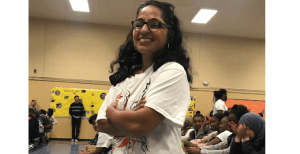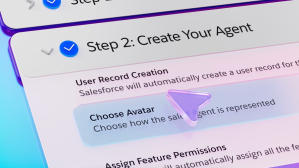Neha Ummat is Principal of West Oakland Middle School, where she focuses on providing students with opportunities to learn about technology and benefit from a culturally responsive curriculum. After spending a few years teaching history in the Oakland Unified School District, and learning a great deal from her experience teaching in East Oakland, she began her tenure as a Principal, and has much knowledge of the challenges that schools now face.
West Oakland Middle School, along with other schools in the San Francisco Bay Area, has benefited from Principal’s Innovation Fund investments from Salesforce, and Salesforce employees have volunteered at the school, assisting students with everything from all aspects of their studies, including learning about technology. We caught up with Ummat for an interview on challenges that schools are facing and how companies can help.
Why is it important for students to learn computer science skills?
The typical answer you hear is that we’re in a very tech-savvy area and there are a lot of jobs in technology. I think that is true. But, to be honest, we don’t necessarily know what careers will look like 15 or 20 years from now. So many things are changing in the workforce. That’s why I don’t always like to think about education as automatically steering people into specific types of jobs.
What I observe in the computer science classes is that students take a lot of ownership over their learning, and they get really excited about design issues and how they can use technology to make the world better. We’ve had some good work go on surrounding how you can design something either in engineering or in computer science that can help the local community. Students love collaborating on these projects.
Can you share what you’ve been able to do with the Principal’s Innovation Fund ($100K of unrestricted funds)?
We’ve been able to be creative, and we’ve been able to try new things. We have tried to pay teachers for extra time and extra work that they do around helping students and encouraging students to collaborate with each other. We are paying teachers to work after school with students because we have found that when students get that extra time it’s really effective.
We have invested in learning about culturally responsive teaching. We have training and books for teachers to help them become more well-versed in that area. We’ve also been able to leverage Techbridge, which is an engineering program for girls that occurs after school.
What are some challenges schools are facing and how can companies help?
Obviously, people are aware of budget cuts and things of that sort across various school districts. There are always fundamental needs. For example, we don’t have air conditioning in our classrooms.
There are also challenges around perception of public schools and in Oakland this is important. I tell everyone that if you have children in a school district be aware of the schools. Find out about them, and actively participate in the school system in some way. I think that people get invested when they have a stake in what’s going on, and I think that companies can help most when they actually have a real stake as well.
What have Salesforce volunteers done at West Oakland Middle School?
They’ve been really helpful. They have done a lot of beautification projects. At the beginning of the school year and over the summer they helped paint. They have decorated our hallways. They helped in setting up chairs and tents for events, and they have helped clean up after events, which meant that our staff could engage with families. Among events that they’ve helped out with are back-to-school nights, the science fair, and parent conferences. Salesforce volunteers have even sat with students and helped them practice their science fair presentations.
The volunteers also identified a need a few years ago to update our library. They raised money to get us an entirely new collection of books that has helped fuel the renovation and renewal of our library. Our 200 students checked out over 1,000 books over the course of five months last year. We look forward to continuing that growth this year.
What are you excited for this school year?
I’m really excited that we have a sixth-grade wing of our school. We are using another hallway on the campus, and we are putting all of our sixth-grade classes in an entirely different building. We’ve been able to cultivate a sixth grade experience where students are being supported and nurtured a bit more.
I’m excited about our staff. We have very experienced people–people who are ready to jump in and bring some real rigor to students with their instruction. Our teachers are also collaborating well with each other. We’re going to jump in much more thoroughly this year with our project-based learning, which is really exciting.















